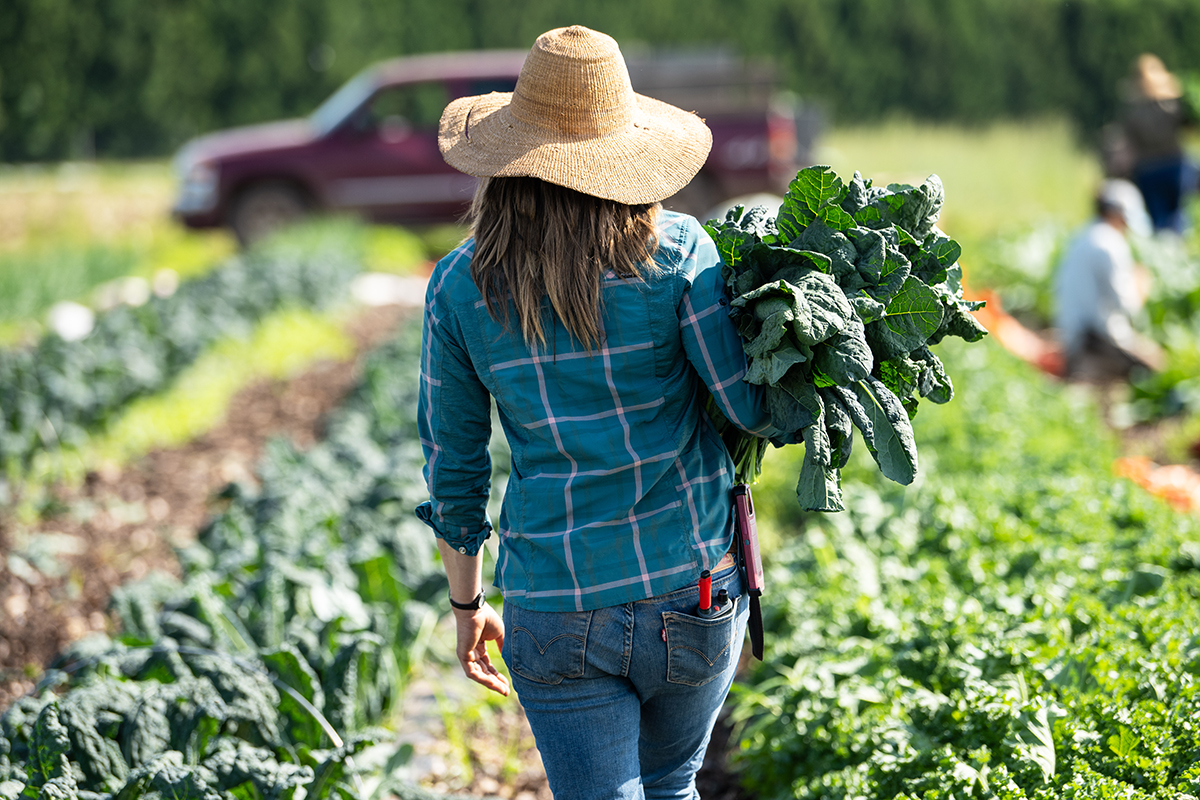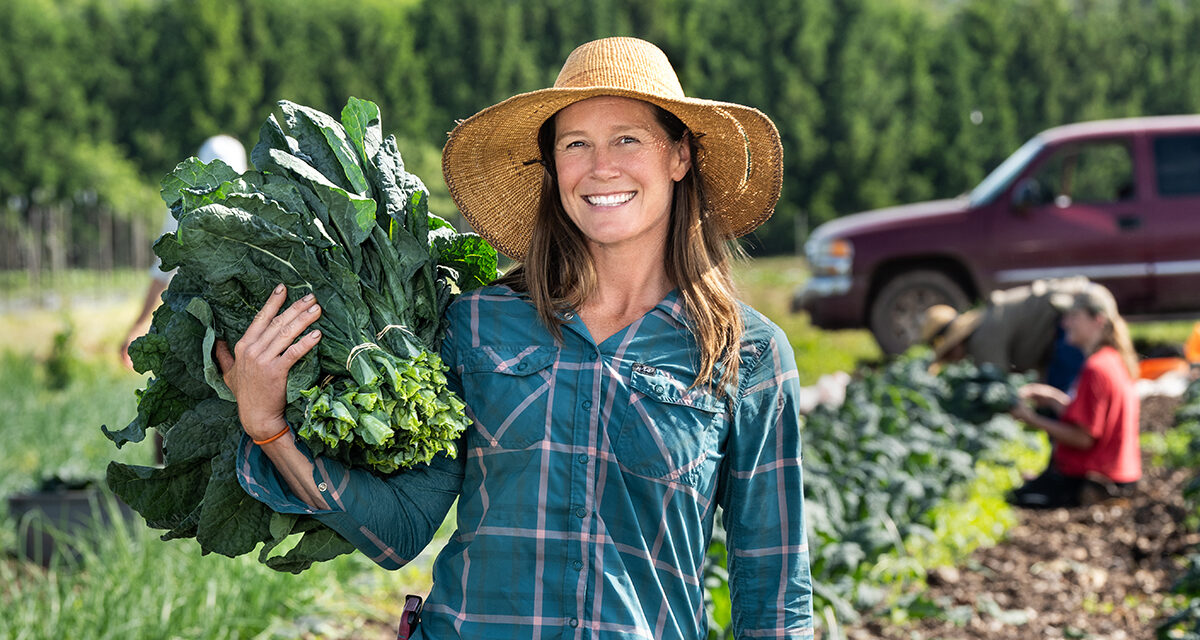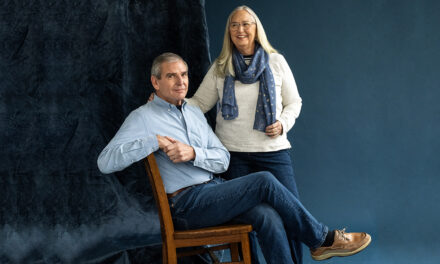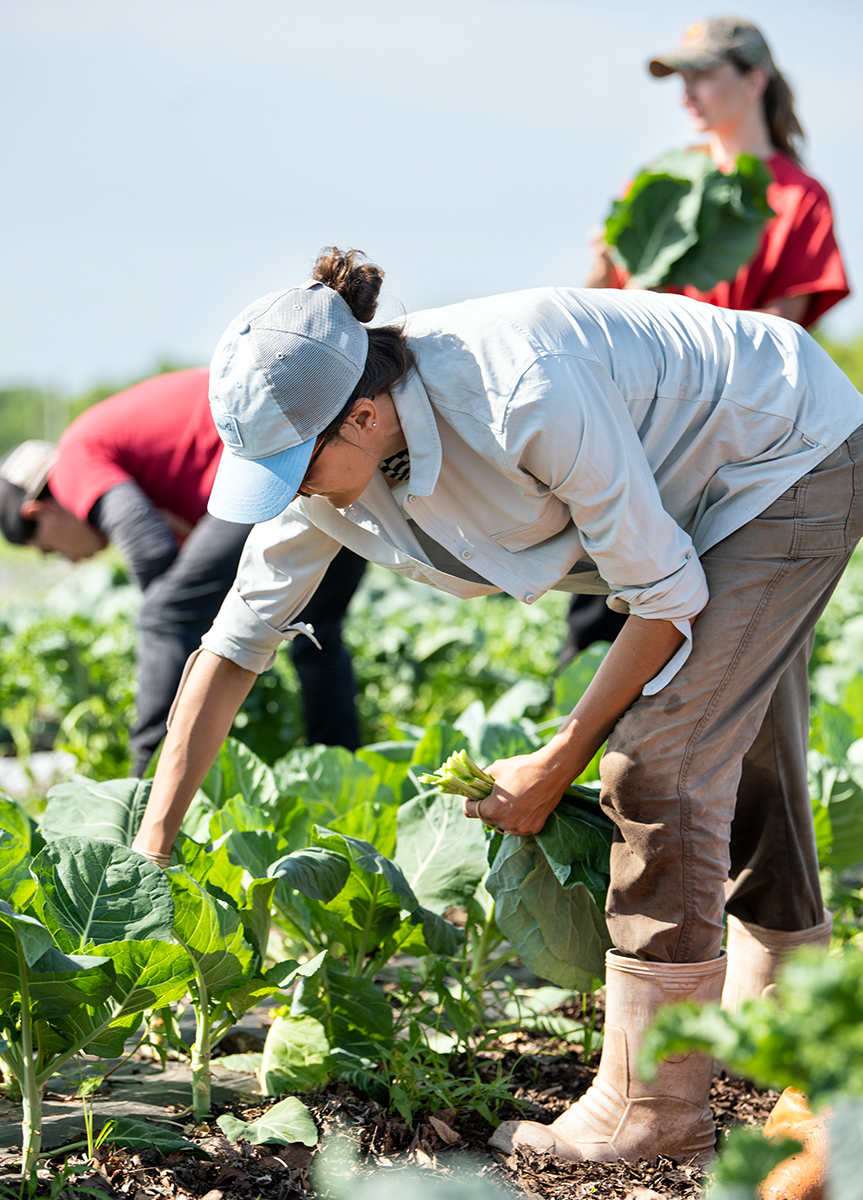
I don’t get too much of a thrill from lightning anymore because sometimes it’s gotten too scary. But in those moments, you need to make all the right decisions right away. If you don’t, you’re going to lose farm products or infrastructure.
It’s just after 9:30 a.m. on one of the first hot days in May at Chickadee Creek Farm in Pennington, NJ. As she gets ready to head out into the field, Jessica Niederer looks over her shoulder at the old pickup truck that’s loaded up for one of the newer members of her crew to make a delivery. She cocks an eyebrow and mumbles something about the battery. She takes about six steps away before a dull, metallic clicking sound putters from the truck. She does a 180, produces jumper cables seemingly out of nowhere, and returns to the truck. She hooks up the cables, and while it’s charging, the same crew member hops on the ATV to get moving on another job that needs doing. Niederer starts walking away again, this time mumbling something about the potential of her new employee having trouble starting the vehicle. Sure enough, she can’t get it to start, and Niederer strides over to show her how to get it going. “It’s a little temperamental,” she says.
With those little fires extinguished, she heads over to one of the four high tunnels in the middle of her 80-acre farm—structures that protect plants from severe weather—where three other employees are preparing to plant rows of flowers in one of the nearby fields using a tractor with a waterwheel transplanter. She scans the scenes, looking at the tractor and her employees with thoughtful consideration. She pins one with an appraising look and asks him if he’s wearing sunscreen. He gives her a coy smile and admits he forgot, and she produces some, seemingly out of nowhere, for him to apply.
Before they get on the tractor, she outlines her team’s gameplan for the morning and shows them how to pinch the plants from the base to keep them intact. As they slowly tuck the fledgling flowers into their beds, Niederer watches from a distance. Before they get too far, she tweaks how much water is coming from the hoses (“We don’t want to drown them…”). As the owner and operator of the farm, Niederer is the coach and often the quarterback—not only does she want to ensure that things are done well and that her organic crops will be healthy and vibrant, but the safety of her staff is always top of mind.
From planting, harvesting, and selling dozens of organic fruits, vegetables, flowers, and herbs, farming is grueling physical work, but it’s also a business that involves careful planning, troubleshooting, and balancing the books. But even with the most careful plotting and preparedness, farming can be unpredictable, especially as weather becomes more extreme, Niederer says. “Sometimes it’s grueling and methodical, but the farm can also be an adrenalized workplace. The prime example is when one of those middle-of-New Jersey heatwave thunderstorms hits, and we have to run around get the whole crew inside safe but still maintain productivity. Even while we’re getting doused with water, we’re still working and getting the high tunnels closed up so the plastic doesn’t rip off,” she explains. “I don’t get too much of a thrill from lightning anymore because sometimes it’s gotten too scary. But in those moments, you need make all the right decisions right away. And if you don’t, then you’re going to lose farm products or infrastructure.”
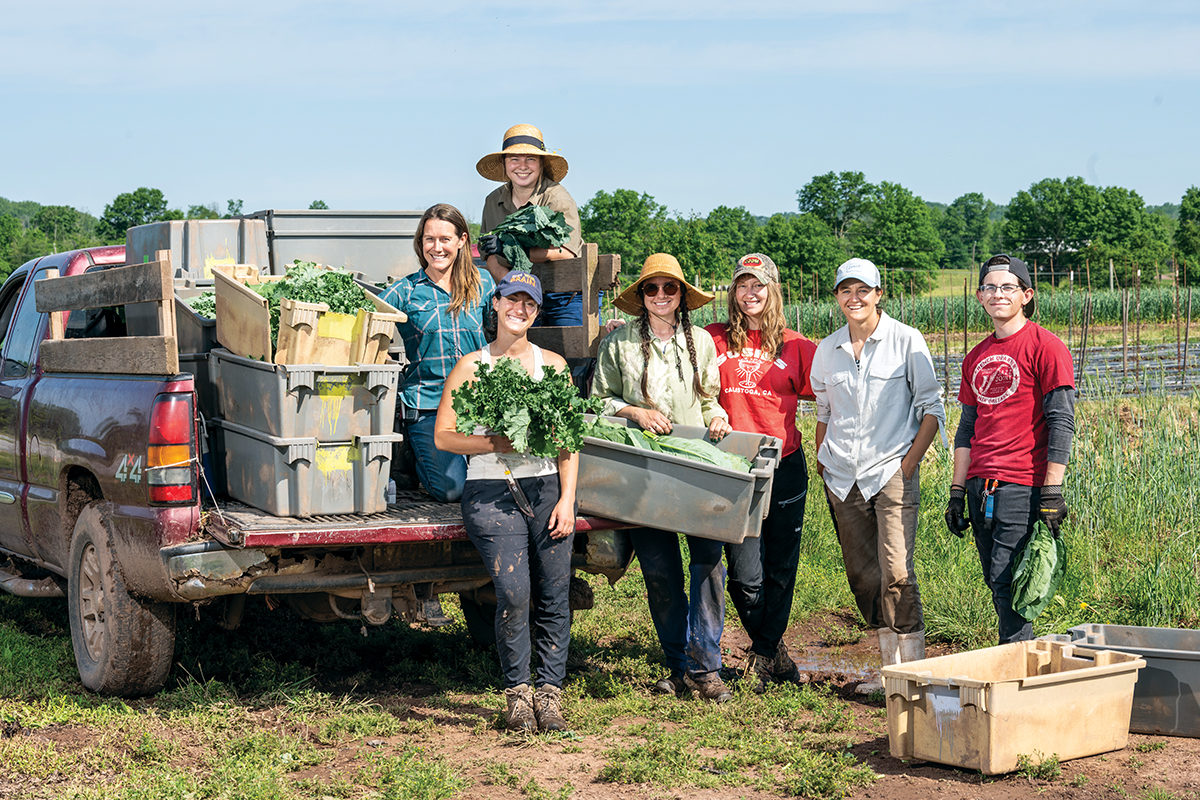
Planting the Seeds
At 40 years old, raising 5-year-old twins, Helen and Brendan, with her husband, Kevin, a full-time nurse, managed chaos is a bit of a way of life. Niederer is built for those moments of extreme stress and unpredictability. She learned that when she became an emergency medical technician after college. “I found that I like that rush of an emergency and that I have a good head for it,” Niederer says. “When shit is hitting the fan, that is when I’m performing the best.”
Plus, farming is literally in her blood—Niederer is the fourth generation to farm in Hopewell, NJ. Her great-grandfather and his children invented a machine in the 1930s called the Egomatic, an egg-sorting machine that revolutionized what was previously a tedious process.
Growing up, while her dad maintained a full-time job as a maintenance supervisor, he also grew wheat and soybeans on the farm, which he later changed to growing hay. “I loved being on the farm as a kid. If every kid could grow up on a farm, that’s the way to do it,” Niederer says. “I also liked having something I could do to gainfully contribute. I was never a big kid, but during the hay harvest I could still use my bodyweight to move around bales and help stack bales. Later, I cleaned out the horse stables, although it was my brother who got to do most of the work on the tractor.”
Although she didn’t see herself heading into farming, Niederer was a “nature nerd.” (“At one point, I was the kid in New Jersey who knew the most about soils.”) After high school, Niederer went to Cornell University in Ithaca, NY to study natural resources en route to hopefully becoming a conservation biologist.
However, after Hurricane Katrina and Hurricane Rita ravaged New Orleans in 2005, Niederer volunteered for 9 months to help gut and sanitize homes overtaken by floodwater. That experience changed everything. “That’s the first place that I was exposed to racial inequity and long-standing poverty. It was always there for me to see, but I just had a privileged lifestyle where I didn’t have to see it,” Niederer recalls. “After that, I knew I was not going to be able to come back and study birds. I knew I still loved the environment, but I wanted to do something that had more to do with people and human health. I thought food and farming could be a fit.”
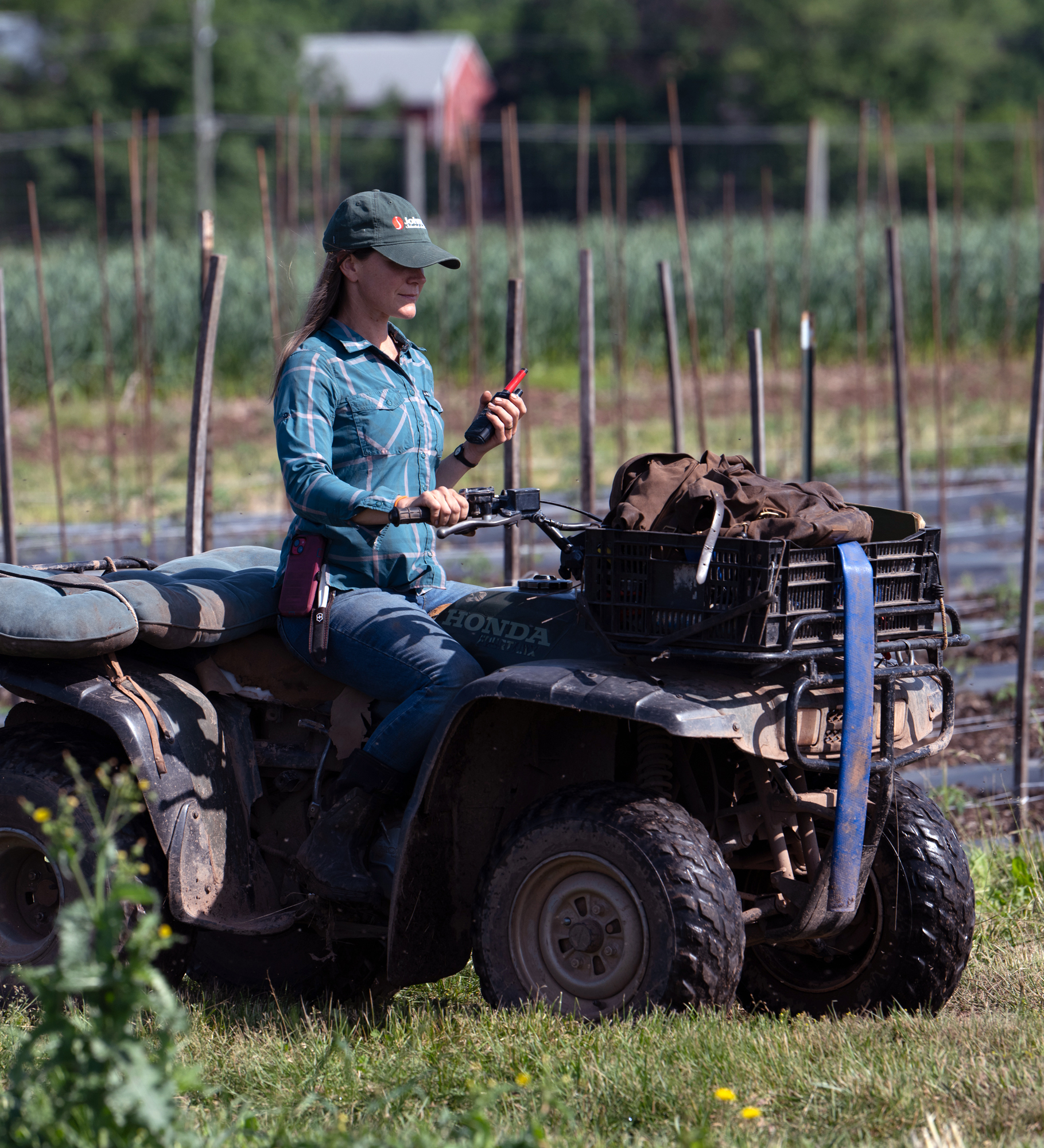
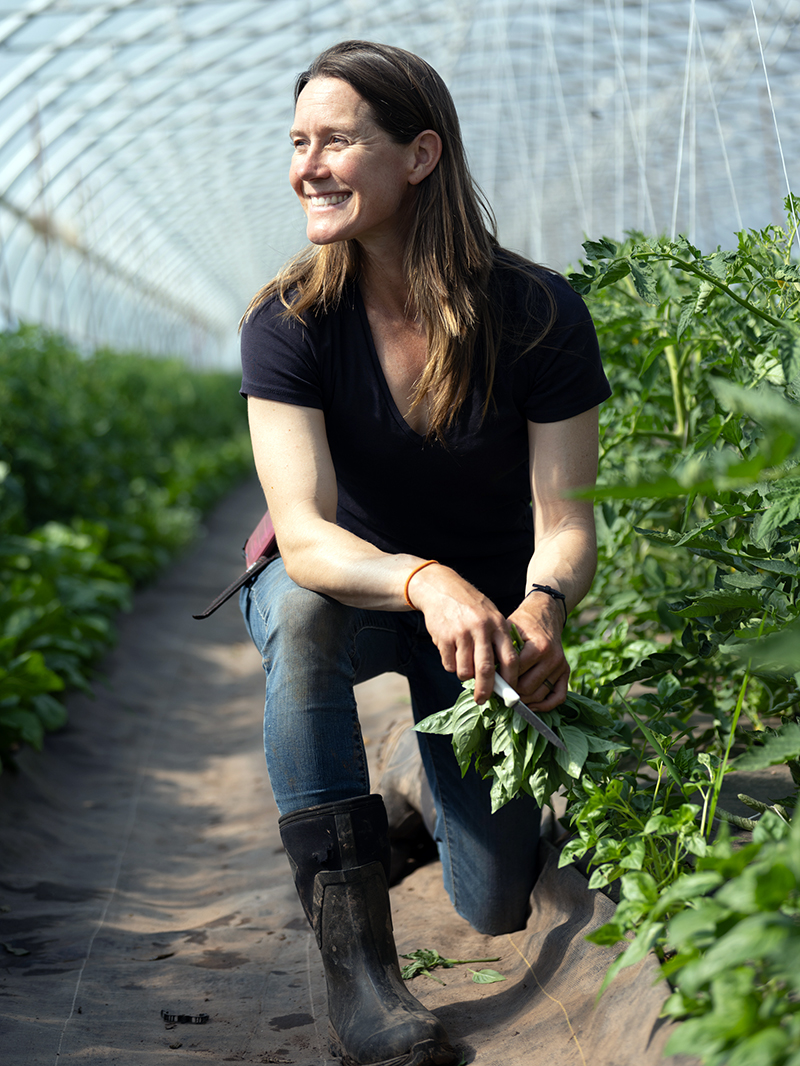
The Dirt Road
Growing up, Niederer received the message that supporting yourself through agriculture was a losing proposition, so after graduating from college, she searched for another local farm that seemed to be making the numbers work and asked for a job. For 2 years, Niederer worked on the 60-acre farm called Honeybrook Organic Farms, first as a greenhouse manager and later as assistant field manager, which proved to be the necessary crash course for the kinds of hands-on technical skills she’d need to be a capable farmer. “That’s where I discovered farming on a basic level—everything from where soil tests are sent to how to turn on a tractor that’s being a pain. As an apprentice, I learned how to grow the vegetables and operate machinery and the different paths for plant health,” she says.
But while the fundamentals of farming were a crucial piece of the equation, Niederer also had to answer a bigger question—did she like farming? “Farming is kind of grueling. You work a lot, and so much of it is physical labor,” she says. “As it turns out, I relish physical labor.”
With that experience and knowledge at her back, in 2010, Niederer leased 5 acres from her parents, which enabled her to grow 2 acres of produce with borrowed equipment, enough to get Chickadee Creek Farm up and running. Niederer began using organic practices, following the rules of the National Organic Program to grow vegetables. She immediately began the process toward organic certification (beginning in 2010 and completing in 2012), and today Chickadee Creek Farm is 100 percent Certified Organic.
Niederer consistently looked for ways to innovate, stay on top of extreme weather and changes in climate to the best of her ability, improve the quality of her crops, and make Chickadee Creek Farm financially viable and sustainable. She works with Hopewell Township Public Works to improve soil resources, making more than 100 tons of leaf mulch compost yearly and using it in the fields. She also built the high tunnels, which not only protect her plants from severe weather but helps extend her production season for several of her crops. Niederer invested in a 40-foot insulated container unit outfitted with a low-cost, low-energy cooling system for storage of veggies like carrots, potatoes, and turnips.
Niederer carefully planned and honed her business strategy, working with local farmers markets, community-supported agriculture, and direct sales from the farm to cut out the middleman—a more efficient model based on community relationships.
According to Niederer, her farming and business strategies and approaches are not particularly innovative as much they are as science- and data-based. But they did help garner her attention: In 2017, she was voted the Local Hero by Edible Jersey readers in the Farm/Farmer category, and she was the recipient of the 2016 National Outstanding Young Farmer award from the Outstanding Farmers
of America.
While Niederer was grateful for the recognition, what she values most is her ability to grow the farm and make it a model for sustainable agriculture with a healthy business infrastructure. “I don’t think the way we make the math work on Chickadee Creek Farm is different than most other businesses where someone is watching the numbers,” Niederer explains. “With our 50 different crops, we do net profit analysis on the crops where if I have any kind of concern that we are not making what we need to on them to be able to pay people reasonably and have our target of reinvestment in the business year to year, we make changes.”
Twin Changes
As methodical as Niederer is, the event that took her most by surprise had a little bit to do with egg sorting, ironically.
She and her husband, Kevin (who was also her prom date in high school), got pregnant in 2019. Although the pregnancy wasn’t completely expected at that moment, the couple took it in stride. “We didn’t get an ultrasound until the 21-week anatomy scan. We went to Capital Health, and we told the ultrasound technician we didn’t want to know the sex of the baby. She told us to look away at the part where you might see genitals, and then she was silent for a long, long time,” Niederer says. “She eventually told us there were two babies, and [Kevin and I], the two most unflappable people, were genuinely surprised.”
Just 6 weeks later, the bigger shock came in the form of contractions, which she first thought were Braxton Hicks. Instead, her twins, Helen and Brendan, were born prematurely at Capital Health, weighing just over 2 pounds each. Both babies spent months in the Capital Health Level III Neonatal Intensive Care Unit (NICU)—Helen for 2 months, Brendan for 3. “It was a difficult place to learn to bond as a first-time parent, but we were just so grateful to have a Level III
NICU just a 10-minute drive away,” she says. “It meant we could be with them but also work as close to full time as possible while they were in the NICU so that we would be able to take leave when they got out.”
Ultimately, the babies thrived, and today the 5-year-old twins love being on the farm as much as Niederer did when she was a kid. Raising twin toddlers and running a farm is complex and taxing, but when people ask Niederer how she balances it all, she fights off an eye roll. “The reality is that my husband is not the helper—he’s the lead parent. Of the two of us, he does far more childcare than I do. He wants to do it, and he’s better at it than I am. Without him and his parents helping us, this would not be possible.”
Not the chicks. Not the Chickadee.
